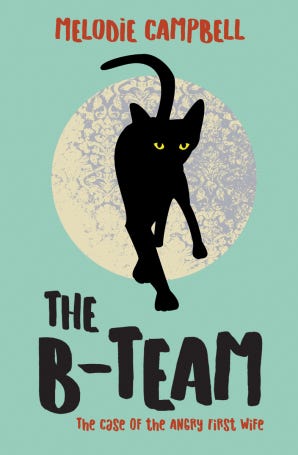Choosing the point of view for your novel is a critical decision. Today, we’re hosting an expert to talk about the rules (and when to break them) that apply to the first person point view.
I’m so pleased to host Melodie Campbell today. Melodie was one of the first authors to connect with me when I started out. She’s generous with her advice. She’s full of encouragement. And she’s an award winning author who also teaches writing.
Check below for Melodie’s newest release, The B-Team. So new, in fact, it just came out last week.
So over to Melodie…
First Person Rocks! Here’s what you need to know about the rules…
By Melodie Campbell
(First published on Sleuthsayers Crime Blog in the U.S., 2017)
The rules, the rules…
Always, in my Sheridan College Crafting a Novel class, beginning students are alarmed to find out there are rules to writing.
I’m not keen on rules in general. After all, I became a writer so I could thumb my nose at reality, right? Control the world of my fiction in a way I can’t control real life.
All that said (and I could make a blog post out of just that line above) there ARE rules to writing. A bunch of middle-aged guys behind a baize-covered door didn’t make them up for no reason (double negative — Ha! Rule-breaker, you.)
The rules are there for a purpose. They’re all about logic. Here is one that is perhaps least understood. You don’t have to follow it (more on that later.) But you do need to understand why it is a rule, so that you know the consequences of breaking it.
Writing in first person
Many, many people don’t know the rules of first person viewpoint. So here goes:
The protagonist becomes the narrator. As a writer, you make a promise to the reader. (Remember that phrase: promise to the reader.) In first person, the character that is telling you their story is telling it directly to you. No third party writing it. You are in her head.
I love first person. I *become* the protagonist when reading or writing first person. Studies confirm this. Readers become more involved in the story and protagonist when reading first person. That’s what makes first person rock. In my books <sic> it’s the ultimate escape.
But first person has huge limitations for the writer: the person telling the story must be in every scene. Otherwise, they won’t know what is going on in that scene and can’t convey it to the reader (unless you employ a second person to run back and forth, telling the protagonist. Note the use of the word ‘tell.’ Telling is ho-hum. You won’t want to do that often.)
If your story is in first person, you can’t be switching to another character’s viewpoint. Ever. Nope, not even another viewpoint in first person. Why? Because your reader thinks this: “What the poop is happening here? The book started in first person. The protagonist is supposed to be telling me the story. Now someone else is telling it. What happened to my beloved protagonist? Are the original protagonist and protagonist number two sitting next to each other at twin desks writing the story at the same time and passing it back and forth? This doesn’t make sense.”
In a phrase, you’ve broken your promise to the reader.
So here’s what to do: if you need to write the story in more than one viewpoint in order to show every scene, write the whole story in third person. Then you can change viewpoints as needed.
One more first person restriction: if your protagonist is telling the story directly, then he can’t die at the end of the story. This should be obvious: if he died, who wrote the darn manuscript?
Finally, do NOT write a first person story and have the viewpoint character a surprise murderer at the end! We are supposed to be in his/her head. Logically, we would know.
Okay, those are the rules. You can write what you want, of course. That’s the delight of being an author. I’m sure you’ll be able to name a few crime books that break the rules of viewpoint.
But in my class, you will hear this: The rules are there for a reason. Of course you can break the rules, but if you do, you will lose something (usually reader continuity and engagement.) It’s up to you to decide if you gain more by breaking the rules than you lose by doing so. BUT: If you break them in your first novel, publishers (and readers) will think you don’t KNOW the rules.
So at least go in knowing the rules. And then do what you damn well please.
Final words: Don’t publish too soon. Take the time to learn your craft. And then…be fearless.
About Melodie Campbell
The Toronto Sun called her Canada’s “Queen of Comedy.” Library Journal compared her to Janet Evanovich. Melodie Campbell has won the Derringer, the Arthur Ellis Award, and eight more awards for crime fiction. Last year, Melodie made the Top 50 Amazon Bestseller list, sandwiched between Tom Clancy and Nora Roberts. She is the past Executive Director of Crime Writers of Canada. Her 13th book, The B-Team, launched last week. It’s in first person.
- http://www.melodiecampbell.com
- Melodie Campbell, Author, on Facebook
- @melodiecampbell
THE B-TEAM!

They do wrong for all the right reasons…and sometimes it even works.
Perhaps you’ve heard of The A-Team? Vietnam vets turned vigilantes? They had a television show a while back.
We’re not them.
But if you’ve been the victim of a scam, give us a call. We deal in justice, not the law.
We’re the B-Team.
StoryTeller is creative editing software for fiction writers. Transform your story, not just your words. Successful stories depend on your ability to edit, improve, and revise your work. Only when you master story editing, can you master storytelling.
Why not check out Fictionary’s StoryTeller free 7-day trial and tell powerful stories?

